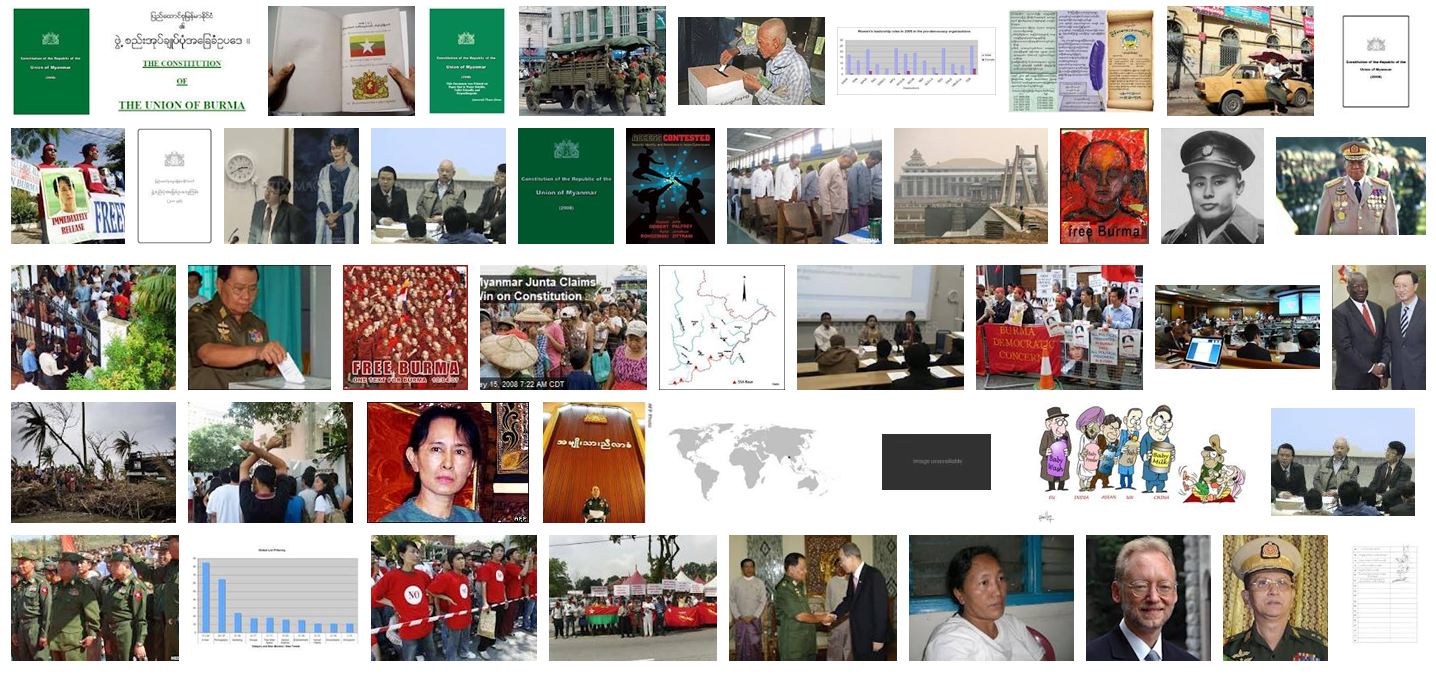While Burma watchers continue to debate the extent of and motives behind Naypyitaw’s current reform process (see here for my take), there seems to be much wider agreement that the 2008 Constitution is a deeply flawed document. Indiana University Maurer School of Law Professor David C. Williams calls it the “worst he had ever seen.” Other writers describe it as a patent tool to ensure military dominance over politics.
While much of this criticism is just, it is also difficult to imagine that a liberal democratic constitution would have survived long even in Burma’s current political environment. The constitution itself is only a piece of paper representing careful elite negotiations about the rules of the political game. The U.S. Constitution works because neither political party could ever completely dominate the country. Thus, each has an incentive to see that the government respects the political rights of political losers as well as winners. By contrast, Burma’s military remains powerful enough to demand a veto over any reforms. Thus, the 2008 Constitution does not create the underlying power imbalance, but merely ratifies it.
Fortunately, constitutions are not static but rather respond to underlying political dynamics. Much constitutional change comes not from rewriting the words in the text, but rather reaching a new consensus on how to interpret those words. After all, constitutional language is often imprecise, sometimes deliberately so. However, in those instances when even the smartest lawyers cannot find new meaning in old words, political elites amend or rewrite the constitution to reflect new political developments.
This happens more frequently than one might think. In fact, constitutions generally live fast and die young. According to research by Tom Ginsburg, Zachary Elkins, and James Melton with the Comparative Constitutions Project, the average lifespan for constitutions is just 19 years. To put that in perspective, a generation in the U.S. is around 25 years. (Alternatively, the average constitution lives one year less than the average Canary.) The U.S. Constitution, which will soon celebrate its 225th anniversary, is the exception, not the rule. Thomas Jefferson, who believed each new generation should write its own constitutional compact, would feel vindicated.
So should critics of Burma’s 2008 Constitution, if history is any guide. Burma’s previous two constitutions — 1947 and 1974 — each lasted around 14 years. Moreover, the 2008 Constitution lacks the ingredients for a long-lived constitutional recipe — an inclusive drafting process, detailed provisions, and a flexible amendment procedure. The question is not if Burma’s democratic opposition will be able to change the constitution, but rather when.
It’s worth looking at how other countries have handled constitutional transitions. After all, Burma’s military is not the first to have written a constitution that assures itself a veto over an elected government. When the 1988 referendum restored democracy to Chile, Pinochet’s constitution established a National Security Council; prohibited the president from removing the commander-in-chief of the armed forces; reserved 9 out of the 35 seats in the senate for non-elected appointees; and established high barriers to amendments (sound familiar?). Today, Chile is a vibrant democracy not because Pinochet wrote a good constitution, but rather because democratization made it in the military’s interests to not block constitutional reform. In 2005, the Escobar government worked out a deal with conservatives and abolished all of the aforementioned restrictions.
It’s also not uncommon for newly democratic governments to avoid the amendment process by simply convening a constitutional convention to write a new constitution. Starting afresh also encourages drafters to consider topics not included in the previous constitution. After overthrowing Marcos in 1986, Cory Aquino’s coalition took this approach in order to circumvent conservatives in the congress and ensure that the new constitution reflected their progressive human rights and nationalist economic goals. For that to happen, the country — and particularly political elites — must support the move to a new constitution. That is why almost every government puts new constitutions to a public referendum — as a symbol of that national consensus.
This approach of course frees constitution drafters from the straightjacket of a constitution imposed by the military. However, it also entails risks by reopening old debates and forcing political elites to spend time and effort forging new compromises. After 1998, for example, Indonesia’s major parties chose not to replace the 1945 Constitution for fear that doing so would give Islamists an opening to propose enshrining Shari’ah law in a new constitution. In the end, Reformasi eventually amended the constitution beyond recognition, but also managed to forestall debate on the role of Islam.
Which path is better for Burma? Will democracy be more stable if the new government accommodates the old? Or should Burma begin with a tabula rasa? Unfortunately, political scientists have only just begun to research these questions. The decision will depend heavily on the exact nature of the democratic transition. However, when transitions come they often come quickly and without warning. It is worth thinking about not only which provisions of the 2008 Constitution should be amended, but also about the risks and benefits of starting constitutional bargaining anew. If history is any guide, Burma might face this choice within the next decade or so.
Dominic J. Nardi, Jr. is a Ph.D. student in the University of Michigan Political Science Department. He also has a J.D. from Georgetown University and an M.A. in Southeast Asian Studies from Johns Hopkins. His research focuses on judicial politics in Indonesia, the Philippines, and Myanmar.
 Facebook
Facebook  Twitter
Twitter  Soundcloud
Soundcloud  Youtube
Youtube  Rss
Rss 